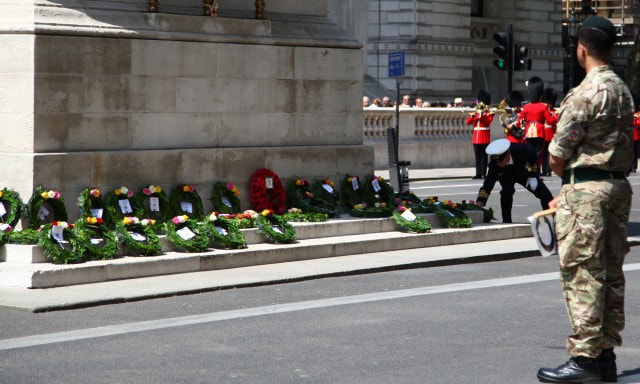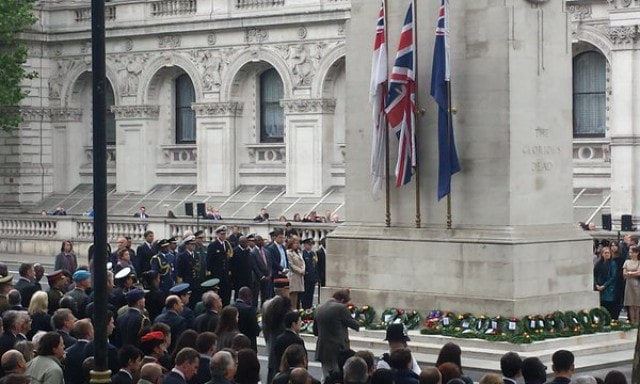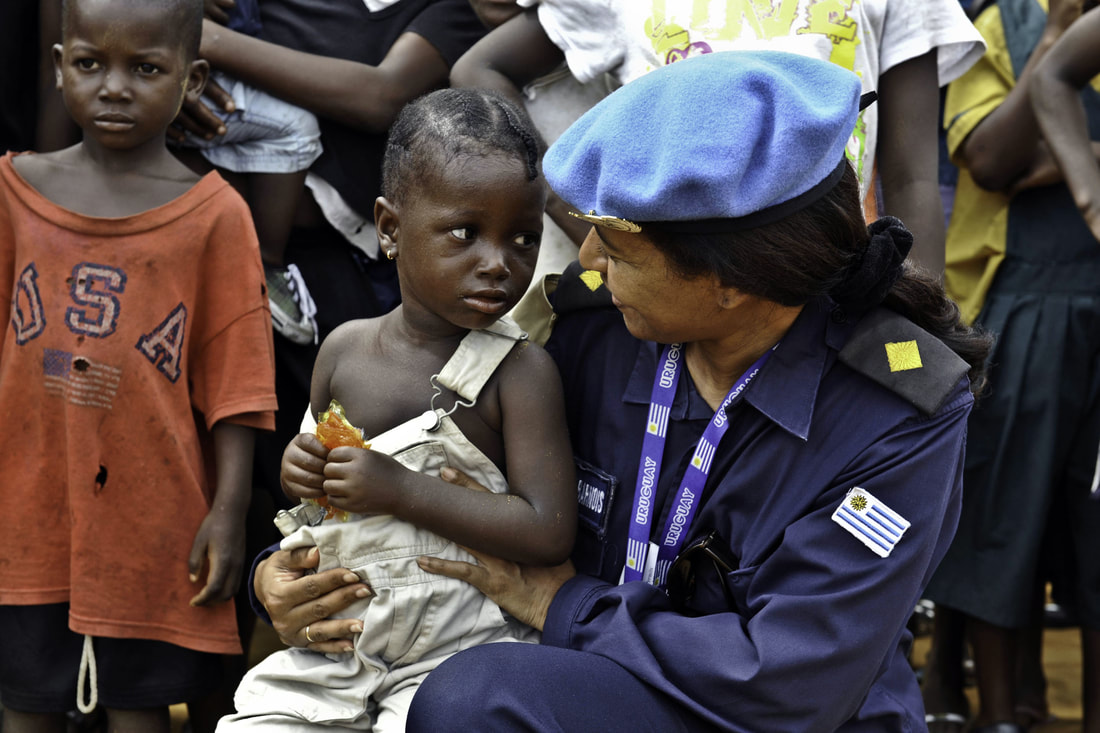MISSION JUSTICE
The campaign to stop sexual violence by UN Peacekeepers
|
Monday is the International Day of United Nations Peacekeepers. To mark the event, a memorial ceremony and conference were held by UNA-UK in partnership with UNA-Westminster and the Royal United Services Institute (RUSI). The event is the biggest such occasion in Europe and this year attendance hit an all-time high.
The ceremony took place at 1315 on May 24 and was the first event to be held on Whitehall following the terrorist attack in Manchester. The band of the Welsh Guards, veterans of the UN Veteran Association, 14 VIPs (including Tessy Antony, Princess of Luxembourg, Alok Sharma, Parliamentary Under-Secretary of State, Foreign & Commonwealth Office, and General Sir Chris Deverell, Commander of Joint Forces Command) and the ambassadors, defence attaches and representatives of 115 different Embassies and High Commissions marched from the RUSI building to the Cenotaph where they laid wreaths to remember peacekeepers who have fallen in duty. Over 3,500 peacekeepers, 104 of them British, have given their lives in the service of peace while deployed with the United Nations. Photographs and a full list of participants are provided below. Natalie Samarasinghe, Executive Director of UNA-UK, said, “Peacekeepers risk their lives in some of the most dangerous places on earth in order to protect people and help countries create the conditions for lasting peace. These brave women and men give a lot to make our world safer, and over the years over 3,500 have given everything. It is right that we pay our respects, and we are delighted that such a significant section of our diplomatic community chose to do so”. The memorial ceremony was part of a day-long conference on making peacekeeping work better, attended by over 180 experts and practitioners. Ewan Lawson, Senior Research Fellow, RUSI, opened the conference with a moment of reflection for the victims of the Manchester attack. He introduced General Sir Gordon Messenger, Vice Chief of the Defence Staff, Ministry of Defence, who emphasised the importance of gender representation in peacekeeping and outlined the British Government’s “3P” agenda for improving peacekeeping: better planning, meaningful pledges, and increased performance. The first session was entitled “‘Better Peacekeeping’ or ‘People Centred Peacekeeping’? What do these approaches mean and how can they be implemented?” Chaired by Dr Karin von Hippel, Director-General of RUSI, it featured Hilde F. Johnson, former Special Representative of the Secretary-General and Head of UNMISS (South Sudan) and Dr David Curran, Research Fellow, Coventry University. Hilde Johnson succinctly captured the basic concept of ‘people centred’ peacekeeping as being "don't abuse people, work to protect people, and engage with people and listen to them”. She stressed the importance of engagement, and said that more work was needed to improve the UN Security Council resolutions that mandate peacekeeping missions, including to ensure that they recognise that the host state can be a hostile actor. David Curran discussed the performance element of the 3P agenda, in particular questions of training and doctrine. He pointed out that the Security Council had mandated missions to ‘robustly’ use force, and had tasked missions with promoting ‘stability’ but had not adequately defined what either term meant, or how they could be squared with the traditional ‘three principles’ of peacekeeping: impartiality, non use of force, and host nation consent – all of which were coming under increasing pressure. This necessitated revisiting the fundamental doctrines of peacekeeping, something that hasn’t been done since the writing of the ‘Capstone’ doctrine in 2008. The second session was the Folke Bernadotte Memorial Lecture. Natalie Samarasinghe, Executive Director, UNA-UK chaired the session and reminded the audience that the lecture was in memory of Count Folke Bernadotte, the UN’s mediator in Palestine, who was assassinated in Jerusalem in 1948, becoming the first member of United Nations Staff to be killed in the line of duty. She then introduced the keynote speaker: Major General (Retd) Patrick Cammaert, the former General Officer Commanding of the Eastern Division of the UN Organization Mission in the Democratic Republic of the Congo (MONUC) and a former UN Force Commander and investigator. Major General Cammaert concentrated on the need for stronger leadership and exceptional field commanders, saying leaders must have the willingness and ability to hold individuals and units to account for their actions, and the new Secretary-General must show personal leadership. He also emphasised the importance of the UN Secretariat having the right tools and mechanisms to effectively monitor performance. He emphasised that Security Council mandates were only as strong as the willingness of commanders to implement them. He also stressed the importance of the wider political processes within which peacekeeping must sit, and the need to have more women in leadership positions within peacekeeping. A video of Major General Cammaert’s speech will be made available on the RUSI website shortly. After lunch, the inaugural Margaret Anstee Memorial Seminar was held. It started with reflections on the life of Dame Margaret, the first woman to lead a peacekeeping mission and the first woman to reach the rank of UN Under Secretary-General. Antonio Luvualu de Carvalho, Ambassador at Large for the President of the Republic of Angola, and HE Miguel Neto, Ambassador of Angola to the United Kingdom, spoke about Dame Margaret Anstee’s importance to Angola’s peace process and presented her cousin Peter Anstee with a plaque depicting her last meeting with the Angolan President. Peter offered some spontaneous remarks about the Anstee family. Prof Christine Chinkin, Emerita Professor of International Law and Director of the Centre on Women, Peace and Security, LSE, spoke about Dame Margaret Anstee’s importance to the Women, Peace and Security agenda. Fred Carver, Head of Policy at UNA-UK, noted that she had been a longstanding member and adviser to UNA-UK and a personal friend of many UNA staff. The session then considered the topic: “Leadership and accountability: how to improve trust and credibility in a context of ongoing allegations of sexual exploitation and abuse and a perceived failure to protect”. It was chaired by Professor Chinkin, with Nicola Dahrendorf, former Director and Senior Advisor on Sexual Abuse (SEA) & Chief of the MINUSCA Conduct and Discipline Team, Central African Republic; Dr Marsha Henry, Associate Professor, LSE, and Fred Carver as panellists. Nicola Dahrendorf spoke about the importance of sexual exploitation and abuse being recognised as part of a wider problem, within the broader context of violence, and the broader Women, Peace and Security agenda. As an anthropologist, she felt that the deeper issues of power, gender, race, and the legacy of colonialism from which sexual exploitation and abuse often stem were largely unaddressed. She thought the response of the UN had been honest, but that member states showed varying levels of commitment to it. She made an appeal for the humanitarian doctrine of “do no harm” to be applied to peacekeeping. Marsha Henry summarised her recent research on peacekeepers’ behaviour. This demonstrated that peacekeepers were a far from homogenous group but that in many instances anxiety drove the desire to be a peacekeeper - as peacekeeping offered stability and financial security. Some peacekeepers were therefore concerned that allegations of sexual abuse could threaten their job security. At the same time there was a sense of troops seeing what they could get away with. At the leadership level, this frequently resulted in an approach which attempted to cut down on incidents by preventing any kind of contact between peacekeepers and the local community, which was to the detriment of people-centred peacekeeping. Dr Henry further suggested that addressing sexual exploitation and abuse required far more attention to be paid to the practical needs of survivors. The attitudes of troop contributing countries to sexual abuse at the domestic and national level, and not just the behaviour of their peacekeepers or armed forces, should also be scrutinised. Fred Carver outlined UNA-UK’s Mission:Justice campaign and the unveiled results of his recent poll and his plan for tackling abuse. He spoke about how reform attempts to date have concentrated, with varying degrees of success, on addressing issues of culture, training, coordination and process, but that there has been a limited focus on judicial processes. He felt that such reforms were entirely necessary, but would not be sufficient unless complemented by serious attempts to ensure prosecution of criminal acts of abuse. The conference was then brought to a close by David Wardrop of UNA-Westminster and Tessy Antony, Princess of Luxembourg and a former peacekeeper herself, who thanked all the participants and our generous sponsors: the High Commission of Canada and the Consulate-General of the Republic of Angola. She summarised the day’s proceedings with some pertinent observations on the events in Juba last year, and the lessons that could be drawn in terms of coordination and leadership. A copy of her remarks is available here.
0 Comments
The United Nations Association – UK (UNA-UK) will use its commemoration of the International Day of UN Peacekeepers – the biggest of its kind in Europe – to release a six-point action plan for tackling sexual exploitation and abuse (SEA) by UN peacekeepers.
180 experts and practitioners will attend a day-long conference on 24 May at which they will hear presentations from Hilde F. Johnson, former Special Representative of the UN Secretary-General and Head of the United Nations Mission in the Republic of South Sudan (UNMISS) and Major General (retired) Patrick Cammaert, former General Officer Commanding, East Division, United Nations Organization Mission in the Democratic Republic of the Congo (MONUC), and the author of the Independent Special Investigation into the violence which occurred in Juba in 2016 and UNMISS response. The conference is organised jointly with the Royal United Services Institute (RUSI) and our Westminster branch. At 1300, a memorial service will be held at the cenotaph at which Alok Sharma, Parliamentary Under-Secretary of State, Foreign & Commonwealth Office, General Sir Christopher Deverell, Commander of Joint Forces Command of the United Kingdom, other VIPS, and representatives of the embassies and high commissions of over 110 countries will lay wreaths to commemorate fallen peacekeepers. Last week, UNA-UK polled its nationwide supporter base and found that 88% think that not enough has been done to prevent SEA by UN peacekeepers. This is despite a 20+ year process of reform at the UN, culminating in a new task force and report from the UN Secretary-General in April of this year. But reform needs to stretch beyond the UN. Indeed, only 29% of respondents felt that the UN Secretary-General and Department for Peacekeeping Operations should do more. By contrast, 71% felt that the countries that contribute peacekeeping troops must take responsibility. Peacekeepers remain under the jurisdiction of their country, not the UN, which can therefore take only limited action. UNA-UK’s Mission Justice campaign calls for states to live up to their responsibility to prosecute criminal acts of sexual exploitation and abuse. Released today, our six-point plan calls for states to act on six measures that will help countries to prosecute peacekeepers that fall under their jurisdiction, and to ensure the international community steps into the gap when they do not. Natalie Samarasinghe, Executive Director of UNA-UK, said, “Sexual abuse destroys lives. Sexual abuse in conflict destroys communities. Sexual abuse by peacekeepers destroys trust – putting at risk the country’s future and even peacekeeping itself. “We believe passionately in peacekeeping. We also believe passionately in listening to, and helping, victims of abuse. That is why we are launching this campaign. “Multiple attempts at reform, dating back several decades, have seemingly not led to a marked reduction in the nature or severity of allegations. We believe this is because they are constrained by the structural and systemic immunity peacekeepers enjoy. If peacekeepers believe they will not be prosecuted it fosters a climate of impunity and severely curtails the impact of the commendable steps taken by the UN Secretary-General. “This is a shared responsibility. It falls in the first instance to the states that deploy peacekeepers to prosecute. If these states are not able to live up to their responsibility then the international community, and the UN, should help them to do so. If this too is unsuccessful, then the international community must step into the gap.” Launching his own report into the issue last month, UN Secretary-General António Guterres said, “Such acts of cruelty should never take place. Certainly, no person serving with the United Nations in any capacity should be associated with such vile and vicious crimes. Let us declare in one voice: We will not tolerate anyone committing or condoning sexual exploitation and abuse. We will not let anyone cover up these crimes with the UN flag.” Photographs will be live tweeted over the hashtag #Peacekeepers17 Read our six point plan Part of our regular series of background briefings on the UN in the news. Peacekeeping is in the news. President Trump wishes to cut funding to the UN for peacekeeping. Tough negotiations reduced the UN presence in Haiti, and, by a smaller amount, in the Democratic Republic of Congo. Allegations of sexual abuse persist. Against this backdrop on Wednesday UNA-UK will join with UNA-Westminster and the Royal United Services Institute (RUSI) for a day long conference and Europe's largest ceremony commemorating peacekeepers. What is it all about? What is peacekeeping? Peacekeeping is an intervention into an area of instability in order to facilitate the transition of that area back towards peace. Peacekeepers can be civilians and are frequently police officers, but the majority of peacekeepers are armed military personnel. Peacekeeping is not only performed by the UN. The African Union (AU) has several active peacekeeping missions, in addition to joint missions with the UN. The EU, NATO, member states such as France, and ad-hoc coalitions such as the 'Multinational Force' in the Sinai have also conducted peacekeeping missions of one form or another. What can UN peacekeepers do? The role of UN peacekeepers is to enforce a mandate given to them by the UN Security Council. Peacekeepers can therefore do as much or as little as the Security Council resolution allows them. These resolutions are adapting with the times. The traditional role of a peacekeeper was to observe the ceasefire line in a frozen conflict, and in a minority of missions (Cyprus and South Lebanon) that is still the case, but most missions are now more complicated than this. An emergent norm from subsequent generations of peacekeeping missions was that the role of a peacekeeper was to extend the legitimate authority of the state. But in some of the increasingly fragmented and fragile conflicts where peacekeepers currently operate, the state cannot be thought of as a singular entity, and its legitimacy is not beyond question. Nowadays the role of the peacekeeper is often to protect civilians, including by the use of force, in situations where there is limited peace to keep. This requires a new kind of mandate. Traditionally peacekeeping has relied upon three principles:
However, these principles now have to be interpreted creatively. Increasingly peacekeepers are given mandates which allow them to to robustly protect civilians, even if this means using force to prevent the loss of civilian life. However, it is still clear that peacekeepers are not peace enforcers, and that when there is truly no peace to keep the efficacy of peacekeeping missions is far more limited. Current operations Currently the UN deploys just over 113,000 peacekeepers: 82,700 armed troops, just under 12,000 police, nearly 2,000 military observers, 5,000 international civilian personell, around 10,000 local staff and 1,500 volunteers. Around 4,000 peacekeepers are women. 124 different countries contribute these personnel. They are reimbursed for doing so, and are supported by the UN Department for Peacekeeping Operations, however, the contributing country retains responsibility for uniformed personnel's conduct, and can ultimately determine where they are sent and what tasks they perform. Ethiopia, India, Pakistan, Bangladesh and Rwanda are the primary troop contributors. How much does it cost and who pays? Peacekeeping costs around $7.9 billion a year. To put that number into context, this represents less than 0.5% of global military spending. The cost to the UK is around $450 million, around £5.30 - the cost of a pricey pint - per person per year. UN peacekeeping represents very good value for money. The cost of deploying a UN troop is over 80 times less, than that of deploying - for example - an American troop to perform the same task. The cost of peacekeeping is shared between member states according to a special formula. The amount that states contribute to the UN budget (itself the result of a separate formula based upon ability to pay) is taken as a starting point. Then less wealthy nations are given progressively larger discounts based upon their relative wealth. These discounts are paid for by charging a premium to permanent members of the UN Security Council (the UK, US, China, Russia and France) in recognition of the greater responsibilities that come with their greater degree of control over peacekeeping. Does it work? Yes. Recent positive examples of peacekeeping include Liberia and Sierra Leone, while the situation in Mali, the Central African Republic and the Democratic Republic of Congo is considerably improved as a consequence of the UN's intervention. Several academic studies have determined that the presence of peacekeepers significantly reduces the risk of renewed warfare, and that the more peacekeeping troops and police deployed, the fewer the civilian deaths. A study by the Rand Corporation concluded that: "the UN success rate among missions studied (seven out of eight societies left peaceful, six out of eight left democratic) substantiates the view that... the UN provides the most suitable institutional framework for nation-building missions that require fewer than 20,000 men; one with a comparatively low cost structure, a comparatively high success rate, and the greatest degree of international legitimacy" |



 RSS Feed
RSS Feed
